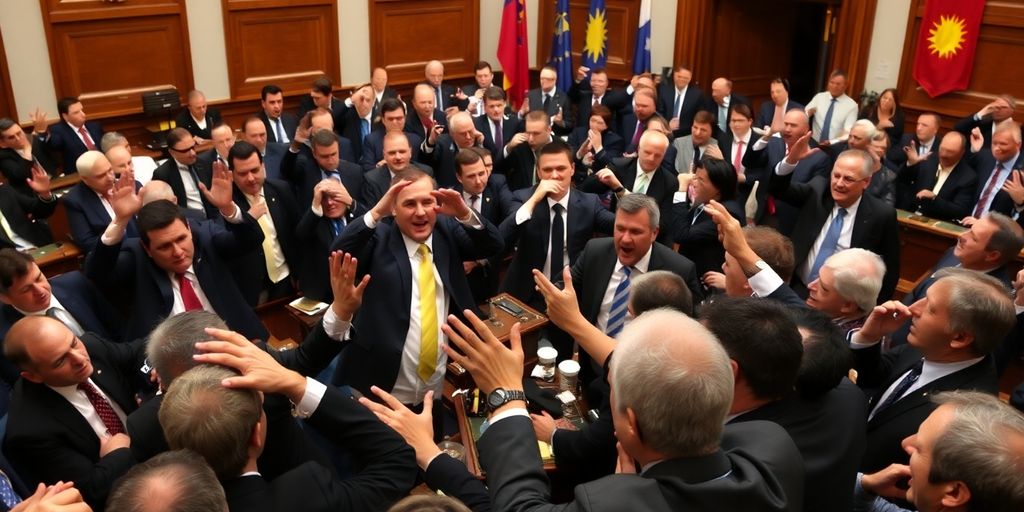Kosovo’s newly elected parliament faced a significant political deadlock on Saturday as it failed to elect a new speaker after swearing in 120 lawmakers. This failure has raised concerns about a potential legislative crisis, jeopardizing the formation of a new government and the continuation of crucial normalization talks with Serbia.
Key Takeaways
- Kosovo’s parliament swore in 120 lawmakers but failed to elect a new speaker.
- The ruling party, Vetevendosje!, holds 48 seats but lacks a majority.
- The opposition parties have ruled out coalition agreements, complicating the government formation process.
- A new cabinet is essential for economic management and ongoing talks with Serbia.
Background of the Political Situation
The political landscape in Kosovo has been tumultuous since the February 9 elections, where the left-wing Self-Determination Movement (Vetevendosje!), led by acting Prime Minister Albin Kurti, secured 48 out of 120 seats. Despite being the largest party, Vetevendosje! fell short of the 61 votes needed to elect a speaker or form a government independently.
During the inaugural session, the party’s nominee for speaker, Albulena Haxhiu, was defeated in two consecutive votes, garnering only 57 votes each time. This failure has left the parliament without a leader, raising questions about the legislative process moving forward.
Implications of the Deadlock
The inability to elect a speaker has significant implications for Kosovo’s governance:
- Unclear Legislative Procedures: Without a speaker, the parliament’s ability to convene and conduct business is uncertain. The constitution does not specify a timeline for electing a new speaker, which could prolong the deadlock.
- Government Formation Challenges: Kurti’s party must secure a simple majority to form a cabinet. However, with the three main opposition parties—Democratic Party of Kosovo (PDK), Democratic League of Kosovo (LDK), and Alliance for Kosovo’s Future (AAK)—refusing to collaborate, the path to a stable government appears blocked.
- Potential for Snap Elections: If Kurti cannot form a government, the president may turn to other parties, and if no coalition can be established, Kosovo could face another round of parliamentary elections.
The Role of Minority Parties
In the current political climate, Kurti has sought support from non-Serb minority MPs and one ethnic Serb lawmaker. However, he still requires at least two additional votes to reach the necessary majority. The parliament includes ten seats reserved for Kosovo’s ethnic Serb minority, with nine held by the Srpska Lista party, which is closely aligned with the Serbian government.
Importance of a New Cabinet
The formation of a new cabinet is critical not only for managing Kosovo’s economy and public services but also for advancing the stalled normalization talks with Serbia. These discussions are vital for Kosovo’s international standing and its aspirations for further integration into European structures.
Conclusion
As Kosovo’s parliament grapples with this political impasse, the future of its governance remains uncertain. The failure to elect a speaker and form a government could lead to significant repercussions, including economic instability and a potential return to the polls. The international community, particularly the EU and the United States, continues to urge both Kosovo and Serbia to adhere to previous agreements aimed at fostering peace and cooperation in the region.
Sources
- Kosovo’s new lawmakers are sworn in but Parliament fails to elect a new speaker, The Spec.
- Kosovo’s new lawmakers are sworn in but Parliament fails to elect a new speaker, Goshen News.
- Kosovo Hits Political Deadlock as Parliament Session Collapses, Bloomberg.com.
- Kosovo’s new lawmakers are sworn in but Parliament fails to elect a new speaker | World, couriernews.com.
- Kosovo’s new lawmakers are sworn in but Parliament fails to elect a new speaker, AP News.




